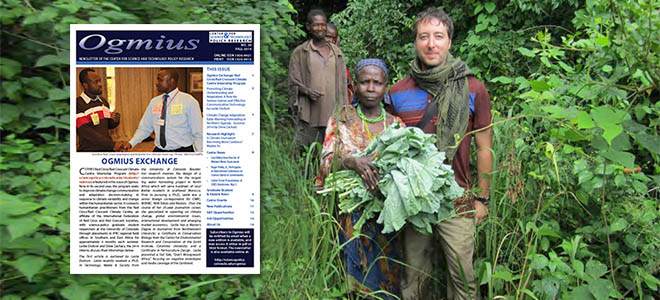Ogmius
Issue 39, Fall 2014
Ogmius Exchange: Red Cross/Red Crescent Climate Centre Internship Program
CSTPR’s Red Cross/Red Crescent Climate Centre Internship Program is featured in this issue of Ogmius. Now in its second year, the program seeks to improve climate change communication and adaptation decision-making in response to climate variability and change within the humanitarian sector. It connects humanitarian practitioners from the Red Cross/Red Crescent Climate Centre, an affiliate of the International Federation of Red Cross and Red Crescent Societies, with science-policy graduate student researchers at the University of Colorado through placements in IFRC regional field offices in Southern and East Africa for approximately 3 months each summer. Leslie Dodson and Drew Zachary, the 2014 interns, discuss their internships:
Promoting Climate Understanding and Adaptation: A Role for Serious Games and Effective Communication Technology
by Leslie Dodson
Climate Change Adaptation: Early-Warning Forecasting in Northern Uganda – Summer 2014
by Drew Zackary
Research Highlight
Our Research Highlight focuses on a study conducted by CSTPR’s Max Boykoff along with Adriana Raudzens Bailey and Lorine Giangola that examined the use of “hedging” language – language that conveys uncertainty – when journalists reported on assessment reports of the Intergovernmental Panel on Climate Change (IPCC). Max is an Associate Professor in the Center for Science and Technology Policy Research, which is part of the Cooperative Institute for Research in Environmental Sciences at the University of Colorado Boulder. He teaches in the Environmental Studies program and is adjunct faculty in the Geography Department. He holds a Ph.D. in Environmental Studies from the University of California-Santa Cruz and Bachelor of Sciences in Psychology from The Ohio State University. Lorine is a Ph.D. graduate of CU-Boulder’s Environmental Studies program, with a focus in natural resource conservation management and policy. Her dissertation “The cost of cleaner water: Linking farmer incentives to conservation outcomes” developed an interdisciplinary method for estimating the costs of achieving certain water quality improvements in agricultural watersheds. Lorine is currently the STEM Coordinator and NSF-CIRTL Coordinator with the University of Colorado Boulder’s Graduate Teacher Program, and she works across campus with STEM graduate students and postdocs to build their skills in teaching science and communicating their research with general audiences. Adriana is a Ph.D. candidate in Atmospheric and Oceanic Sciences at the University of Colorado Boulder. Her dissertation research uses stable isotopes in vapor to distinguish important water cycle processes in the lower atmosphere. Previously Adriana served as the principal media officer for the Cooperative Institute for Research in Environmental Sciences. She’s enjoyed combining her dissertation research skills and past experience with science journalism to investigate how newspapers communicate and construct climate change uncertainties.
Their paper has been widely reported in the media including the Boulder Weekly, Daily Camera, Summit County Citizen’s Voice, Star Tribune, Aljazeera, Science Daily and Mother Jones.
Excerpt: A University of Colorado Boulder research team led by CIRES doctoral student Adriana Bailey, with CSTPR’s Max Boykoff and ENVS Ph.D. graduate Lorine Giangola – examined the “hedging” language – language that conveys uncertainty – used by journalists when reporting on the Intergovernmental Panel on Climate Change (IPCC) assessment reports. The team found that newspapers increased their use of hedging language over time, even though scientific consensus about climate change and its causes has strengthened.
The team tracked “epistemic markers” in four major newspapers – the New York Times and Wall Street Journal from the U.S., and El País and El Mundo from Spain – in 2001 and 2007, the years in which the IPCC released its third and fourth assessment reports. Their analysis focused on articles about the IPCC and about the physical science of climate change, but did not evaluate news reports about the potential responses to climate change.
Epistemic markers included any words or expressions that suggest room for doubt about the physical science of climate change, the scientific quality of the IPCC assessment reports, or the credibility of the panel. The research team counted words like speculative, believe, controversial, possible, projecting, almost, and largely, and modal verbs like could.
They argued that the context in which these words appeared was also important. For example, the word uncertainty was marked as epistemic in the phrase “…substantial uncertainty still clouds projections of important impacts…,” but it was not counted in the phrase “…uncertainty was removed as to whether humans had anything to do with climate change…” Both phrases appeared at different times in the New York Times. Read more …


